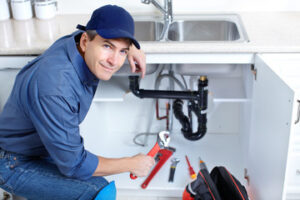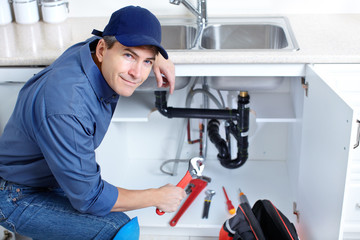A plumbing expert is a person who is knowledgeable and experienced with plumbing. These professionals can fix problems like leaky faucets or clogged toilets. They usually have a good reputation and are known for providing great customer service. They should also have a valid plumber’s license. Moreover, they should be insured and bonded to protect their clients in case of any accidents or damages.
 Plumbing is the piping that delivers water to and from fixtures and appliances. It also includes the drains that dispose of waste. The plumbing system is complex, with many parts and connections. In addition, many different terms can be confusing to those who need to become more familiar with the industry. These terms can make it difficult to understand the instructions in a DIY plumbing project, or even to communicate with a plumber when an issue arises.
Plumbing is the piping that delivers water to and from fixtures and appliances. It also includes the drains that dispose of waste. The plumbing system is complex, with many parts and connections. In addition, many different terms can be confusing to those who need to become more familiar with the industry. These terms can make it difficult to understand the instructions in a DIY plumbing project, or even to communicate with a plumber when an issue arises.
To help homeowners and DIYers avoid confusion, it is helpful to explain some of the basic plumbing terminologies. This will give people a better understanding of the issues they may face and help them decide whether it is best to call a plumbing expert or attempt the project on their own.
Pipes and tubes are the straight sections of a plumbing system. A pipe is typically formed through casting or welding, while a tube is usually made by extrusion. The difference between the two is that pipes are thicker and more rugged, while tubes are thinner and more flexible.
Fixtures are a general term for the sinks, toilets, tubs, and showerheads in a home’s plumbing. A faucet is a fixture that controls the flow of water and can be turned off and on by turning a handle or knob. Faucet aerators are another type of fixture that helps conserve water by mixing air into the stream of water.
Traps are used to protect water systems from contamination. They contain a liquid seal that prevents sewer odors from entering the home. A septic tank is a large underground container that holds sewage and wastewater. The wastewater is then pumped to the public sewer system or treatment plant for processing.
A shut-off valve is a device that allows the user to cut off water flow to specific fixtures or to the entire household. There are typically shut-off valves located underneath every fixture in a home. This is so that the flow of water can be quickly shut off in case of an emergency or leak.
A cross-connection is any physical connection between a potable water supply and a nonpotable water source. A backflow preventer is a device that protects against this by ensuring that the water in one system can’t enter the other.
A plumbing system comprises pipes, tubing, valves and fixtures that supply water for washing, drinking, heating and cooking. It also involves draining wastes. A plumber is a professional who installs, repairs and maintains these systems. A plumber is licensed by a local authority and has the skills, knowledge and tools to carry out these activities. The plumbing industry is regulated by national and state laws and regulations, including building codes and standards. Some states require licensing for plumbers. Other states regulate the practice through voluntary accreditation. A plumber’s job responsibilities include inspection, installation, maintenance and repair of piping, devices and fixtures. He or she may also be responsible for designing and drafting plans.
A typical plumbing system includes a series of pipes, venting and fixtures that convey water-borne waste to the sewage system. These are usually connected to a septic tank. A plumber may also install backflow preventers, filters and heat exchangers to control the quality of potable water. In addition to these, a plumbing expert may also install appliances like water heaters.
Some modern plumbing devices are designed to be barrier-free. This means that they are accessible to disabled or elderly people. These include toilets, showers, faucets, and sinks. They are installed at varying heights to allow wheelchair users to access them. A plumbing expert can help you choose the right ones for your home or business.
Besides the main piping, other equipment used in plumbing systems include expansion tanks, water meters, backflow preventers and pumps. Some of these are automated and can monitor the level of water pressure, flow rate and temperature. Others are manually operated and may be controlled by a switch or lever. The plumbing devices are also linked to each other by a network of sensors and controls.
Despite the many online tutorials and DIY guides on how to do your own plumbing, it is best to leave major plumbing issues to experts. This is because trying to fix a problem yourself can cause more damage to your plumbing and lead to higher costs. You may also end up with a messy and dangerous situation.
Whether you’re dealing with running toilets, clogged drains or a leaking hose bib, having the right plumbing software can make your life easier. By enabling you to track expenses, schedule jobs and dispatch plumbers, the right solution will help you run your business more efficiently, increase productivity and keep customers happy.
It’s important to carefully assess your needs when choosing a plumbing software package. Look for a program that has the features you need without having too many bells and whistles, or you may end up paying for unnecessary features. Once you’ve compiled your list of requirements, compare different products to find the best fit for your business.
The best plumbing software will provide a variety of tools to manage your business, including estimating and scheduling software, project management and document storage. This will save you time and money in the long run, while also ensuring that your projects are completed on time and within budget. Some software platforms will even have mobile apps to make it easier for you and your team to work from anywhere.
Plumbing software can be used by a variety of professionals, including retailers, contractors, engineers and DIY enthusiasts. Retailers use the software to compare pricing and availability of specific items. Contractors use it to calculate costs for commercial and residential projects. Engineers use it to design plumbing systems and to create 3D renderings. And DIY enthusiasts use it to plan and execute their projects.
Using the right plumbing software can help you improve customer service by facilitating communication between staff and clients. It can also help you track payments and invoices more efficiently. Many plumbing software solutions include a client portal where your customers can view estimates and bookings, and easily pay their invoices online. Some even offer automatic payment reminders to encourage on-time payments.
In addition to the software itself, a good plumbing software will also have integrated point-of-sale, CRM and project management software. These systems will help you manage your inventory, track customer contact information and communicate with your team in real-time. It will also allow you to store electronic copies of records, which makes it easy for you to access documents when needed.
Anyone who has had to deal with clogged toilets or leaky faucets knows that you need to call a plumber. The plumber you hire needs to have the right skills, tools and experience. They should also be licensed, insured and bonded. Some plumbers even have a professional certification. Before you hire a plumber, compare their written estimates and fees. You can also ask them for references and check their track record in the community. Ultimately, the best way to find a plumber is by referral.
A plumbing contractor is an individual or company that specializes in plumbing work on large projects such as new construction or major remodeling. They handle a wider range of plumbing tasks than plumbers and are often licensed by their state. They have a strong working knowledge of the code requirements for building and renovation projects, and they can serve as consultants during the planning phase. They are also qualified to install and service gas lines and other complex plumbing systems.
In addition to their extensive plumbing knowledge, they have a keen eye for details and are able to work well with architects and general contractors. A plumbing contractor should have excellent communication and customer service skills, as they often interact with the client directly. They should also have the physical strength to carry and maneuver heavy equipment.
Some plumbing contractors have their own business while others work for a larger corporation or contractor. These companies typically require the contractor to have a master plumber’s license in their home state. They may also have to meet additional licensing and insurance requirements, such as a background check.
A plumbing inspection is a vital part of a property purchase. It can catch problems that are not visible to the naked eye, such as corroded pipes or leaking water heaters. Inspectors can also recommend the necessary repair and replacement parts to keep your property in good condition. Plumbing contractors can perform a variety of inspections, including a sewer inspection and septic system evaluation. They can also inspect and install water filters, water softeners and gas control valves.
